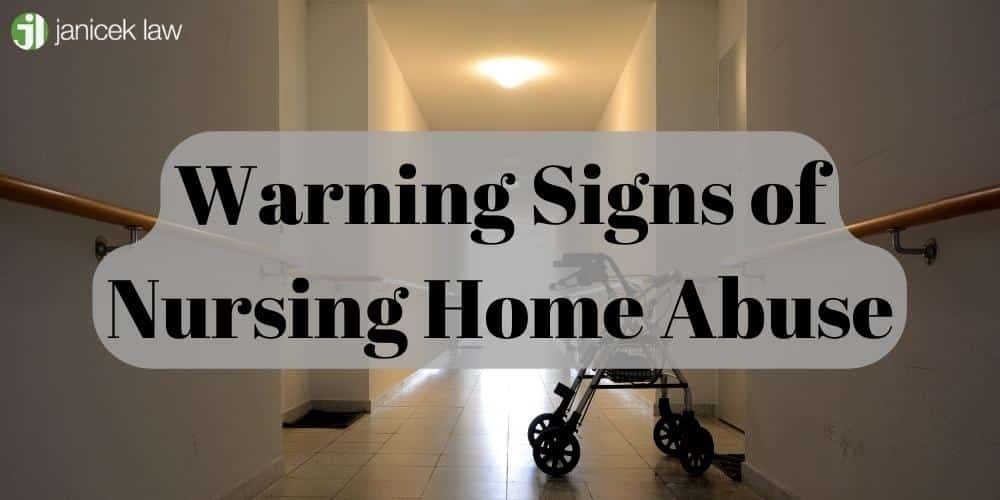Deciding to put a loved one in a skilled nursing facility can be an incredibly difficult decision to make. Many families decide to put their elderly loved ones in a nursing home when they no longer have the skills to care for them. Many elder adults require around-the-clock medical care that the average adult family member simply can’t provide. Unfortunately, elder abuse can be common in nursing homes. Being able to recognize the warning signs of nursing home abuse is essential to keeping your loved one safe.
The nursing home abuse lawyers at Janicek Law can help you identify and bring an end to the abuse. Our experienced team can also help you recover compensation for your loved one’s injuries. Call us today at 210-366-4949 to schedule a free case review with a San Antonio nursing home abuse lawyer.
Is Elder Abuse Common?
Approximately 1.3 million older adults live in licensed nursing homes, residential care facilities, or assisted living facilities. This number is expected to increase with the baby boomer generation aging into retirement and old age. Nursing home residents are at a much higher risk of neglect and abuse than their peers who live in the community. In 1987, the Nursing Home Reform Act (OBRA ‘87) was the first piece of legislation that set up care standards for assisted living residents.
Unfortunately, even these nursing home abuse laws haven’t been able to stop the widespread abuse. The vast majority of nursing home residents have some form of health condition that makes them more vulnerable to abuse in their care facility.
Even with federal regulations in place against nursing home abuse, statistics still show that this is a widespread problem. According to a 2022 survey by the World Health Organization, 2 in 3 nursing home staff members admitted to committing some form of abuse in the past 12 months. In a 2008 study, almost all (91.9%) nursing homes were cited for deficiencies in care. 40% of nursing home residents reported experiencing abuse, while up to 90% said they witnessed abuse in other residents. These saddening statistics show that elder abuse in nursing homes is unfortunately very prevalent.
Types of Nursing Home Abuse
Nursing home abuse and neglect don’t always leave bruises and broken bones (though these are also common injuries). Abuse and neglect can take many different forms, but physical abuse is often the easiest to see. Nursing homes and long-term care facilities are supposed to give nursing home residents everything they need to live a comfortable life. This includes medical care and mental health care. When these aspects of personal care are abused or neglected, your elder family member can experience lasting damage and injuries from assisted living facilities.
Emotional Abuse
Emotional abuse is usually non-physical but it can be just as damaging as physical abuse. Psychological abuse is the most common form of abuse in nursing homes. Verbal abuse falls under this category. Staff members can commit verbal abuse by yelling and screaming at residents, or using insults or threats to harass residents.
Emotional and psychological abuse can also be committed by depriving the resident of their dignity. Leaving residents in wet or soiled clothing, ignoring a resident’s cries for help, and depriving residents of mobility aids are all forms of psychological abuse and neglect.
Physical Abuse
Physical abuse is a form of elder abuse that causes physical harm to nursing home residents. Physical abuse is often the easiest form of abuse to see, but facilities will often make excuses for the injuries that family members see. Physical abuse can result in serious physical injuries to nursing home residents.
Sexual Abuse
Sexual abuse is unfortunately common in nursing homes and long-term care facilities. Nursing home residents can be sexually abused by caregivers, other residents, and visitors. Many of the safety precautions in place to prevent nursing home abuse often protect the abuser instead of the victim. Signs of sexual assault include bruises around the breasts and genitals and unexplained sexually transmitted diseases.
Medical Abuse
Many nursing home residents require around-the-clock medical care from a trained caregiver. Medical abuse is a common form of abuse when caregivers are overworked and under-trained. Knowing the correct medication and dosages is an important part of elder care. Many nursing home residents are prescribed unnecessary antipsychotic medications to keep residents docile.
Another form of medical neglect is a delay in necessary medical treatment. Delays in care can result in physical harm to the resident. In nearly 19% of nursing home residents who were admitted to the ER, their records showed an unexplained delay of 24 hours or more before they received medical treatment.
Financial Exploitation
Financial exploitation is a common form of nursing home abuse as well, but this form of abuse doesn’t leave physical marks. In skilled nursing facilities and nursing homes, staff members can gain access to an older person’s bank accounts. Financial abuse can also include taking a resident’s property or possessions without permission.

Recognize the Warning Signs in Nursing Home Residents
Nursing home residents are often subject to the whim of their caregivers. These caregivers are often not alerting family members to likely elder abuse, so it’s important for you to be aware of the warning signs. Some forms of abuse, like mental abuse, aren’t as apparent as physical abuse.
Being able to recognize nursing home abuse and neglect can potentially save your family member’s life. We’ve outlined the most common warning signs below. If you suspect nursing home neglect or abuse, contact the experienced attorneys at Janicek Law. We can help you identify the abuse and hold the nursing home or assisted living facility accountable for their actions.
Slip and Fall Accidents
According to the Centers for Disease Control and Prevention (CDC), the death rate from slip and fall accidents in older adults increased by more than 30% from 2007 to 2016. At this rate, by the year 2030 we will see 7 fall deaths every hour. 3 million older adults are treated for fall injuries every year, and one out of five falls results in a serious injury. Nursing home facilities are responsible for keeping their residents safe, which means doing what they can to prevent falls. Unfortunately, nursing home residents are more likely to fall than their peers living at home. This is in part due to the severe overmedication of nursing home residents. If you notice your loved one experiencing a higher rate of falls while in a nursing facility, this can indicate larger problems with neglect and abuse in the nursing home.
Bedsores
Bedsores are a type of pressure wound that occurs when residents spend too long in the same position. Nursing home residents, especially those who have mobility issues, should be physically moved by staff members to prevent these painful pressure ulcers.
Some health conditions like diabetes can make nursing home residents more likely to develop bedsores. The nursing home staff should be aware of this and take appropriate precautions. Untreated bed sores can quickly develop an infection and lead to life-threatening health conditions. The appearance of bedsores is a major warning flag. Improper care of bedsores means the staff is likely not paying attention to their residents as they should.
Changes in Behavior
One of the most telling signs of nursing home abuse and neglect is a change in your family member’s behavior. Behavioral changes in your loved one can sometimes be a normal occurrence after moving into a residential care facility.
In other cases, changes in behavior can be an indication of abuse or neglect. Depending on the circumstances of the abuse, the nursing home resident may believe it’s their fault or be afraid of retaliation if they speak up about the abuse. Make sure your family member knows they can safely tell you anything.
Medication Errors
Nursing home residents have a right to take part in their medical treatment. This includes the ability to refuse medication and treatment. Nursing home staff members should only administer medication after receiving professional medical advice and consent from the patient. Many nursing homes administer unnecessary antipsychotic medication to residents.
Antipsychotic medications can keep patients docile and sleepy for most of the day. This means staff members don’t have to pay as much attention to the residents’ needs. Poor training or inexperience can mean that residents get the wrong medication or the wrong dosage. Medication errors can result in severe physical injuries, especially if an allergy or drug interaction is ignored.
Bruises and Broken Bones
Bruises and broken bones can be major indicators of nursing home neglect or abuse. These physical injuries should get immediate attention. Some broken bones and bruises are truly accidents, but many of these injuries are a direct result of physical abuse. Bruising around the genitals and breasts can be a major indication of sexual abuse. Bruising on the back of hands and forearms can be indicative of defensive wounds. Talk to your family member about any new bruises they have.
Neglect of Daily Needs
Nursing facilities are supposed to provide all the care and attention their residents need. When staff members neglect to provide a standard of care for nursing home patients, many signs are usually present. These signs often include:
- Poor personal hygiene
- Not changing a resident out of wet/soiled clothing
- Increase in urinary tract infections
- Dehydration
- Malnourishment
- Sudden weight loss
What Increases the Risk of Nursing Home Abuse?
Some risk factors can increase the chance of nursing home residents being abused. Elderly residents with memory or cognitive impairment are at an increased risk of being abused. Staff members usually target these residents because they can be convinced that the abuse never happened. Residents with mental illness are also more likely to suffer from nursing home abuse. In many cases, it’s not always the resident with a risk factor that increases abuse. Some aspects of the facility itself can increase the risk of abuse.
Understaffed Facilities
Another major risk factor for abuse is an understaffed facility. Nursing home employees are often subject to long hours, not enough training, and too many residents per employee. Overworked and underpaid employees are more likely to take out their frustrations on vulnerable residents.
Understaffed facilities often don’t have the manpower to give every resident the care and attention they need. This increases the risk of residents being abused by other residents and visitors.

Reporting the Abuse
Many nursing home abuse allegations are overlooked or ignored when residents try to report the abuse or neglect. If you suspect nursing home abuse, it’s important to report it to the appropriate authorities immediately.
At Janicek Law, our San Antonio nursing home abuse lawyers can support you through this emotional and overwhelming time in your life. We can help you report the abuse to the appropriate agencies and hold those responsible accountable for their negligence.
How A Nursing Home Abuse Lawyer at Janicek Law Can Help You
The nursing home abuse attorneys at Janicek Law have been defending victims for more than 25 years. During this difficult time, it’s important to use a trusted law firm with a solid reputation. We can help you identify the abuse, report it, and hold those responsible accountable. Recovering compensation for your family member’s injuries may not replace what they lost, but it can help you and your family find appropriate care for your loved one.
Our San Antonio personal injury attorneys can help you and your family recover from this immensely difficult situation. Contact the nursing home abuse attorneys at Janicek Law today by calling 210-366-4949.

